2018 Community Awards Winners
The Howard League Community Awards were presented at the national conference on 14 November 2018 by Gerry Marshall, Trustee of the Howard League for Penal Reform and Chair of the Awards judging panel.
Policing and adults category
Winner
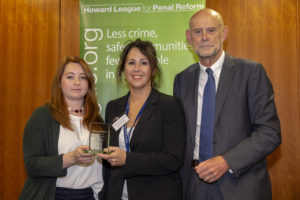
Pathfinder
Devon and Cornwall Police
Pathfinder is an innovative programme that proactively engages people at the point that they are arrested for a low level offence. The keyworkers are employed as police staff and are able to bridge a criminal justice process with a positive response within the community. Although the level of offence might be considered low, their complexity of needs can be high, particularly in our female cohort who are always able to opt for a female worker. Our skilled keyworkers work alongside people and their families for a period of four months to identify needs and improve desistence from crime. Often they discover that, although offenders, they have at one time been a victim of much more serious crime. The contract that they agree includes engaging in voluntary activities. Our clients are often socially isolated, and whilst they dread voluntary work the most at the start, this is the part they often continue with long after the four months. We undertake considerable victim liaison and referrals through to RJ services. Our RCT with the Cambridge University is near completion; but it is the individuals: both victims and offenders that are the biggest advocates for the scheme.
Restorative Approaches category
Winner
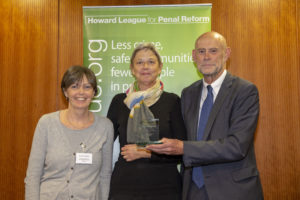
Circles of Support & Accountability
Respond
Respond’s Circles of Support & Accountability (COSA) service supports young people and adults with learning disabilities and/or autism who sexually offend or who are at risk of so doing to build a safe, positive and purposeful life and take responsibility for their behaviour.
Respond’s COSA model brings together a group of five specially trained volunteers who help support and manage the risk of the person with the harmful sexual behaviour, known as the “Core Member”. They meet weekly as a group over a period of 18 months during which time the Core Member experiences regular structured support. Volunteers model positive social relationships, practical assistance and a non-judgmental space in which issues of risky behaviour can be addressed.
Respond’s COSA model meets the need for a non-clinical form of care which takes place alongside its therapeutic work and which acknowledges that people with learning disabilities and/autism who exhibit harmful behaviour do so as a result of isolation and stigmatization. Its adapted Circle model, based on best practice in learning disability and informed by attachment and trauma theory, offers support to those with a history of sexual offending, or at risk of so doing, to live safely in the community.
Policing and children category
Winner
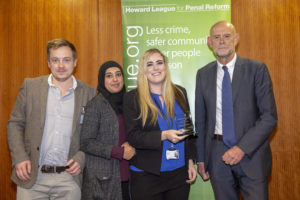
Wakefield Liaison and Diversion Youth Pathway
West Yorkshire Liaison and Diversion
A young person is referred to Liaison and Diversion (L&D) by the police after receiving a community resolution for an offence or having been identified by Anti Social Behaviour Team. By intervening at the earliest point in the Criminal Justice process this prevents further offending and escalation in behaviour. This is achieved by a Youth Focussed L&D Practitioner conducting a home visit and completing a full needs assessment which looks at all aspects of the young person’s life, health and well-being that may be contributing to their offending behaviour. The young person is then diverted on to interventions that are appropriate and proportionate to the offence using restorative practice. This could be a victim awareness or an educational session around healthy relationships.
Young people are also offered voluntary interventions around their unmet needs and vulnerabilities, this is an individually tailored plan and agreed with the young person. Safeguarding is paramount as these young people often present with complex needs. Wakefield Liaison and Diversion lead on ensuring a multi-agency approach is facilitated to meet the needs of the young person in order to address vulnerabilities and reduce risk.
Women category
Winner
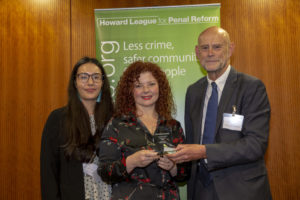
Restore Project
Well Women Centre
Established in 1985, Well Women Centre is a registered charity providing mental health services, support and wellbeing services to women in the Wakefield District.
Well Women Centre offers the Restore project, which works with both statutory and non-statutory women who are involved with the criminal justice system or who are at risk of offending. Our aim is to provide a holistic non-medical approach to women’s health and well-being, with the emphasis on supporting and empowering women. The Restore project offers tailored packages of support, provided in a safe and women only environment.
Case Workers offer tailored advocacy, emotional and practical support to women. Many women have multiple and complex needs including experiences of childhood sexual abuse, violent or abusive relationships and many are apart from their children. This project enables women to access longer-term recovery support. Case workers address women’s long term, varied needs and assess the risks associated with these areas. Well Women Centre prides itself on its client focused support services for the most vulnerable and disengaged women across the Wakefield District.
Commendation
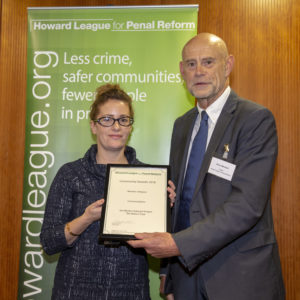
Sex Worker Outreach Project
The Nelson Trust
Our SWOP model is based on targeted welfare addressing issues of complexity and entanglement. We deliver targeted, assertive casework to sex working women, and our approach to addressing women’s disadvantage is a way forward for our women. In a National context, Dr Susie Balderstone conducted research into our targeted intervention for sex working women in Gloucestershire and Wiltshire. Comparators were taken form services across the country and she developed a full understanding of the qualitative evidence that puts The Nelson Trust SWOP firmly at the pioneering forefront of successful delivery of this alternative policy approach. Dr Susie Balderstone, having evaluated our project, developed a clear descriptor of our theory of change, which has 3 key components:
- On-street outreach at night and trauma-informed, non-judgmental casework can engage women and girls at most risk and reduce harm.
- Improving the understanding and multi-agency provision can best tackle sexual exploitation, mental, physical and sexual health, substance use and homelessness, towards exit from sex-work.
- Gender-specific work and training in the Women’s Centre’s creates pro-social contact between excluded groups and improves crime prevention.
Findings of the 2018 Lancaster /Lankelly Chase research showed significant impact of SWOP on the following factors:
- Prevention
- Health improvement
- Increased Prosecution for those profiting from sex working and carrying out violent sexual crime
- Crime reduction
- Recovering from harms experienced by sex working women.
Commendation
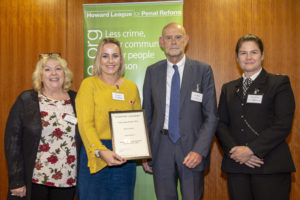
Action on Street Health (ASH) Wirral
Tomorrow’s Women Wirral
The ASH Project offers support and provides outreach to Street Sex Workers within Birkenhead, Wirral. This project was fully funded by Merseyside Police Cash Back Fund. This fund uses money seized through criminal activity.
Sex Workers are a protected group with crimes against them now recorded as hate crimes within Merseyside. These women are often vulnerable and susceptible to violence and theft offences. This ongoing outreach engagement has led to improved safety for the sex workers as well as improved sexual health by offering condoms and chlamydia self-tests, attack alarms, refreshments and a sympathetic ear. ASH encourages sex workers into TWW’s safe women only environment where they are supported to report incidents via Ugly Mugs and Police. The women are also encouraged to engage with appropriate interventions at the Centre.
Residential Care category
Winner
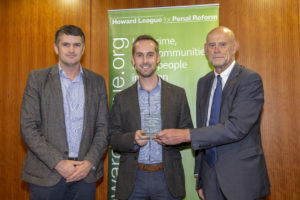
Engage
The Caldecott Foundation
The Caldecott Foundation is dedicated to improving the outcomes for vulnerable young people in the care system. We recognise that children in care are at higher risk of entering the criminal justice system. This is both as a result of their own behaviour within their care setting and their vulnerability to exploitation by criminal gangs.
As an organisation we took the decision to decrease the risk of criminalisation for our young people by targeting a reduction in the number of incidents of ‘missing from care’ and assaults. This led us to develop our ‘Engage’ project.
Through the project we implemented a new relational model, made changes to our child protection procedures and training, developed our culture to value consultation with our young people and built closer working relationships with Kent Police.
Between 2014 and 2017 we succeeded in achieving a 98% reduction in incidents of ‘missing from care’ and a 75% reduction in the number of assaults. We are incredibly proud of this achievement as we believe it has improved the opportunities for the young people in our care to build successful, safe and fulfilling lives free from the stigma of criminalisation.
Commendation
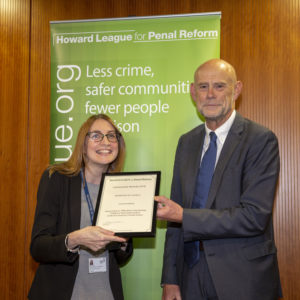
Responding to Offending in Residential Childcare-Next Steps project
Centre for Youth & Criminal Justice
Since 2017 the Centre for Youth and Criminal Justice (CYCJ) have partnered with Staf (Scottish Throughcare and Aftercare Forum) on the Responding to Offending in Residential Childcare – Next Steps project. The aim of the Next Steps project is to inform, influence and support improvements to local and national practice in responding to offending in residential care, by:
- Improving the support available locally to residential staff in decision making
- Increasing opportunities for building relationships between police and residential staff and with young people
- Increasing the availability of information to professionals and young people about the youth and criminal justice system
- Improving local and national multi-agency data collection regarding the numbers of looked after children being criminalised, with the aim of reducing these numbers.
This has involved:
- The development and implementation of a programme for local improvement to provide an understanding of, and influence staff practice in responding to offending behaviour in four children’s houses in Scotland
- Individual and collective discussions with, and the provision of support to, national organisations to consider and reflect on their role in supporting more appropriate responses to looked after children and to offending behaviour and when necessary change practice
- Wider knowledge exchange of the learning gained from the above work and practice support to implement this learning.
Liaison and Diversion category
Winner
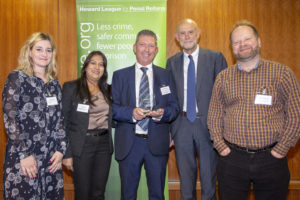
Birmingham and Solihull Liaison and Diversion Service
Birmingham and Solihull Mental Health Foundation NHS Trust
Birmingham & Solihull Liaison & Diversion service has built upon the national service specification for diverting people away from the Criminal Justice System and further developed ways of working. It has established and maintained formal partnerships with Statutory and Voluntary Sector providers alike: West Midlands Police, National Probation Service, Her Majesty’s Court staff, Birmingham Changing Futures, Shelter, and Anawim, to name a few.
Throughout 2018, they have been at the forefront of three successful national pilots; employment of people with lived experience of the Criminal Justice System and complex needs (Peer Mentors); L&D provision into the Crown Court; and the establishment of the Mental Health Treatment Requirements in Health and Criminal Justice.
Engagement rates for our vulnerable service users with complex needs (a combination of Homelessness, Substance or Alcohol Use, Mental Health, Learning Disability, and Criminality amongst others) has been high since inception (80%), providing hope and assisting in their recovery to re-engage with society, and the outcomes for these individuals have often been remarkable. Whilst the rapidly expanding service has had many challenges, the dedication, values, commitment and ethos of the team has remained positive, demonstrating clear aims in practice, enabling alternative but proportionate interventions in the criminal justice system.
Commendation
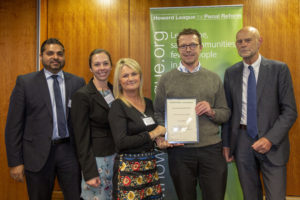
Thames Valley Criminal Justice Liaison and Diversion Service
Berkshire Healthcare Foundation Trust
Berkshire Healthcare Foundation Trust (BHFT) successfully tendered to deliver Liaison & Diversion Services across the Thames Valley region and as such is delivering an all age, all vulnerability service across Berkshire, Buckinghamshire, Oxfordshire and Milton Keynes. Thames Valley Criminal Justice Liaison and Diversion (TVCJLD) aims to improve the early identification of a range of vulnerabilities for individuals who are going through the criminal justice pathway.
The service focuses on identification of vulnerabilities, screening and assessments of individuals, with referral and support to engage with appropriate treatment services. This contributes to an improvement in health and social care outcomes, with the aim to reduce re offending rates. Information in regards to an individual’s vulnerabilities is shared with consent to better inform criminal justice decision making.
The Berkshire service has been in place since 1991 and was identified as a pathfinder service during the development of the national L&D model. The Oxfordshire site was part of the Wave 2 national project which was the first county in Thames Valley to provide an all age, 24/7 model of service. Berkshire & Buckingham were part of the national wave 3 scheme. Since April 2018 TVCJLD has been operating in line with the NHS England’s national operating model.
The service has won awards as team of the year from BHFT and has been awarded commendations by TVP for the work undertaken within custody suites to address the unmet needs of this client group. The service user feedback to date highlights the high regard for the support provided to individuals and this is also reflected from feedback received by stakeholders/partner agencies.
Criminal Justice Champion
Winner
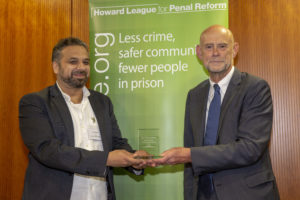
Linda Bryant (award accepted on her behalf by Dee Anand)
Together for Mental Wellbeing
I have been working alongside people experiencing mental distress with highly complex life stories for nearly 30 years. Trained as a Forensic Psychologist, I have worked across health, social care and criminal justice sectors. I first joined Together for Mental Wellbeing, the national mental health charity, as a practitioner within our criminal justice services. Over the last 16 years, I have led the expansion of our portfolio of services in police and court settings, with Together now being seen as a leading voluntary sector provider of liaison & diversion services. A particular passion has been reducing the number of vulnerable women in custody through gender responsive models of support including dedicated women’s Learning and Development practitioners, training justice colleagues and undertaking evaluations to identify evidence-based practice to inform commissioning.
I have also cultivated a twenty year history of working with probation in London and I am particularly proud of research undertaken by Professor Paul Senior that identified the strengths, achievements and longevity of the partnership. Also close to my heart has been the desire to work with younger people to prevent their entry into the justice system and I was thrilled when our Pathways Service in Rotherham won a 3rd Sector Care Award for its work.
Winner
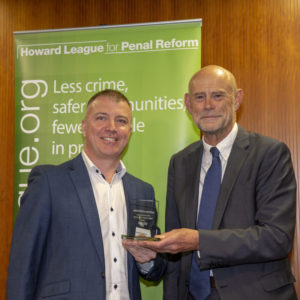
Alasdair Jackson
Recycling Lives
Recycling Lives works with offenders both pre- and post-release, offering opportunities for training, employment, accommodation and personal support to reduce individuals’ risk of reoffending.
Its HMP Academies engage 200+ men and women across 11 prisons. Participants undertake recycling or fabrication work while earning an enhanced wage, developing skills and achieving accredited qualifications.
Its Release Potential team works with offenders approved for Release On Temporary License, and with all participants on their plans for release, ensuring each is able to move into work suited to their skillsets and ambitions, and housing, where necessary. Its residential facility houses men facing homelessness on release from prison. It offers structured support for residents to undertake training, develop skills, address personal problems and move into work and their own home.
Recycling Lives records impressive rehabilitation rates for participants of its programmes – on average, just three in every 100 reoffends within one year of release, compared to a national average of around 67%. Conversely, around two-thirds of those supported move into work upon release. The programmes are supported by Recycling Lives Ltd – a recycling and waste management business which offers training, placements and employment to programme participants and manages recycling contracts through the HMP Academies.
Winner
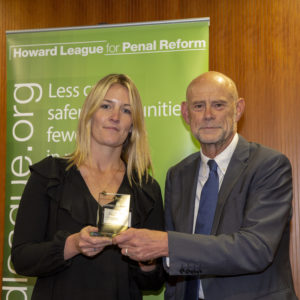
Edwina Grosvenor
One Small Thing
One Small Thing began in 2015 aiming to change the way the current system deals with women, influencing systemic change by encouraging and promoting the adoption of a trauma informed approach across the whole of the female estate. Evidence from places where the approach has been adopted has shown significant reductions in levels of self-harm, suicide and violence in addition to improved recidivism rates.
In the past three years One Small Thing has rolled out training to 4000 prison officers, senior leaders and other criminal justice professionals working within the female estate. Those members of staff have then led the adoption of trauma informed approach and supported residents to deliver peer led healing trauma interventions within each of the prisons.
The work in the female estate has been so well received and is already evidencing positive impact that the MoJ have commissioned it to go across Long Term and High Security Estate and have a pilot currently running in the male estate.
Utilising a peer led approach is best practice; it means the work can be self-sustained despite austerity and all that it brings. It is also why the work is so impactful, empowering residents to understand where they have been and take control of where they are going.
Commendation
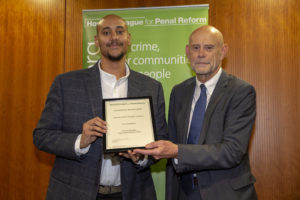
Ahmed Moallim
Leap Confronting Conflict
Leap’s Leadership & Enterprise (L&E) programme supports young people (aged 12-25) at risk of group offending and gang involvement in the London boroughs of Lambeth and Southwark. By replacing the word ‘gang’ with ‘friendship group’, L&E recognises the benefits that being in a group can bring – a sense of belonging, support and safety. As a result, L&E pioneers a ‘whole group’ approach, working with existing friendship groups to give them the skills to hold each other to account, make positive choices and bring about long-term behavioural change.
Ahmed was instrumental in developing L&E, which pushes the boundaries in working with young people at risk of gang involvement. Traditional gang exit programmes remove a young person from their peer groups and, sometimes, families. However, L&E recognises that there are benefits of being in a gang (support, safety, a sense of belonging, financial gain) and that removing a young person from this can leave them more vulnerable and isolated. Ahmed uses an asset-based approach, harnessing the skills that young people already have (leadership, entrepreneurial skills and support networks) and using them positively, to shape a different future.
Organisation of the year
Winner
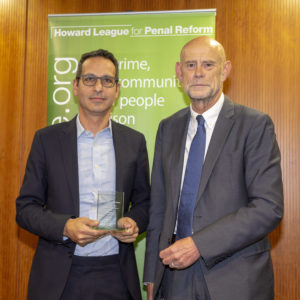
Just for Kids Law
Just for Kids Law (JfKL) is a UK charity that works with and for children and young people to hold those with power to account and fight for wider reform by providing legal representation and advice, direct advocacy and support and campaigning to ensure children and young people in the UK have their legal rights and entitlements respected and promoted. We help young people navigate their way through challenging times through our unique model of working with individual children and young people which combines direct advocacy and development opportunities with legal advice and representation. JfKL has gained a reputation for taking the evidence from our direct work with individual children and young people to fight for wider reform through strategic litigation and empowering children and young people to campaign. We also draw on our evidence to equip practitioners to work for children’s rights and provide them with advice and expertise. Our Youth Justice Legal Centre has been at the forefront of training lawyers in representing children in court. Furthermore, we lead on monitoring compliance with human rights across the voluntary sector by hosting the Children’s Rights Alliance for England.
Commendation
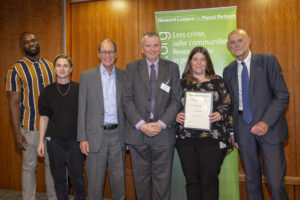
Circles South East
Circles South East is a public protection charity providing specialist resources across the South East and London. Its services commenced in 2002 specifically to deliver what has proved to be a successful sexual crime reduction programme (Circles) using a cohort of trained volunteers to support and monitor sex offenders safely reintegrating back into the communities.
Our recognition that Circles alone was not a sufficient response to the issue of sexual abuse has led to the development of range of complementary services through a process of reflection and innovation resulting in:
- Adaptation of Circles for groups with specific needs –Circles for people with intellectual disabilities, young people (12 to 18 years) and those with rape convictions.
- Developing interventions to increase ability to respond to the needs of perpetrators including development of mentoring and counselling services
- Engaging partners and families of people who perpetrate harmful sexual behaviour
- Extending the principles behind Circles to support the survivors of sexual abuse which has involved the piloting of the service model “Thrive”, together with free counselling.
The Charity’s vision has evolved into something more holistic; its purpose being to provide a comprehensive package of support to anyone whose life has been impacted by sexual harm.
Commendation
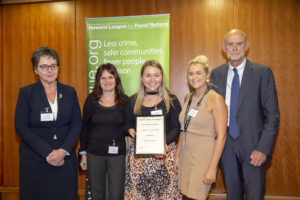
Safer Living Foundation
The Safer Living Foundation charity (SLF; www.saferlivingfoundation.org) was formed in 2014 and is an innovative partnership between HMP Whatton and Nottingham Trent University. The SLF was set up to prevent and reduce sexual offending. With its front-line experience of working with people with sexual convictions, the charity’s trustees understood the gaps in standard provision for people convicted of sexual offences. The trustees envisioned and actioned innovative ways to meet these gaps. Through the charity’s links with a specialist research unit at Nottingham Trent University, the work of the charity is evidence-based, robustly evaluated, and contributes to best practice and theoretical knowledge world-wide.
The charity has achieved several ‘firsts’ within the criminal justice arena: they were the first to run prison-based Circles of Support and Accountability (CoSA), and one of the first organisations to offer free face-to-face support for people troubled by their sexual thoughts. The charity is about to open a ground-breaking centre to help people with convictions reintegrate with society and develop meaningful and prosocial lives.
The SLF regularly publish their evaluation/research findings in peer-reviewed journals, contributing to the global evidence base on reducing sexual crime.
-
Join the Howard League
We are the world's oldest prison charity, bringing people together to advocate for change.
Join us and make your voice heard -
Support our work
We safeguard our independence and do not accept any funding from government.
Make a donation